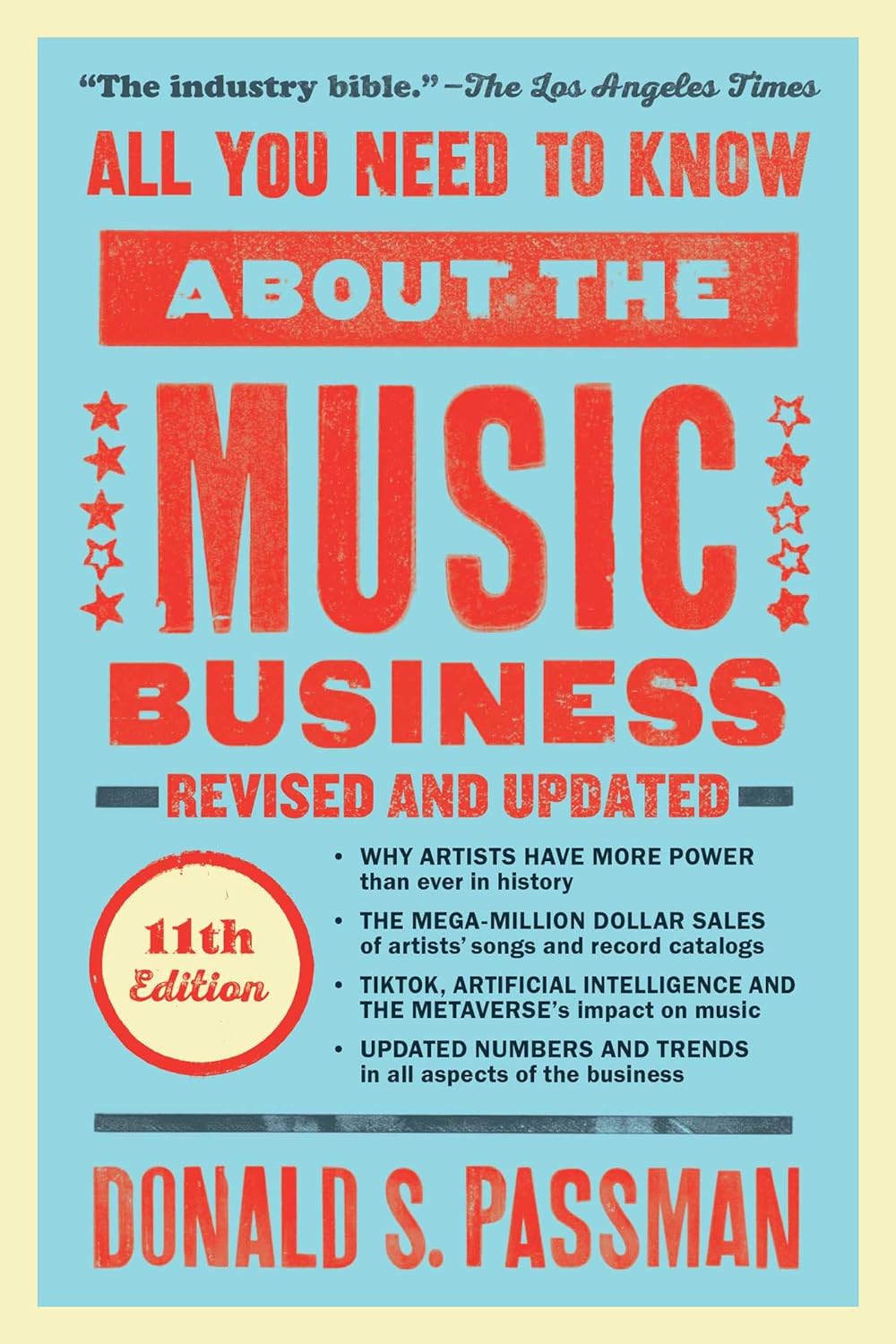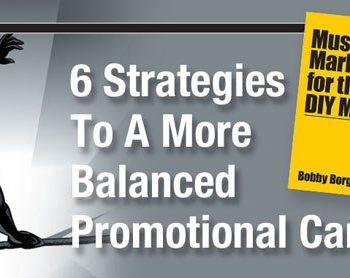By Donald S. Passman
Welcome to the 11th edition of All You Need to Know!
AND FOR YOU SPINAL TAP FANS, “This one goes to 11!” (If you have no idea what the hell I’m talking about, Google it).
I have lots of new goodies for you since we last got together, such as the dominance of streaming, why artists have more power than ever in history, the emergence of music created by artificial intelligence (some argue that’s been going on since the beginning of stoner rock), how TikTok has majorly rocked the music world (and whether that’s good or bad), the recent mega-sales of music catalogs, music in Web3/metaverse/NFTs, and of course updated numbers and practices.
Let’s talk about the professionals you’ll need to maximize your career and net worth. The main players are your:
• Personal manager
• Attorney
• Business manager
• Agency
• Groupies
With respect to number 5, you’re pretty much on your own. As to the others, let’s take a look:
Business Philosophy
Before we talk about the specific players, let me share a bit of personal philosophy. (If “share” is too California for you, try “Let me tell you some of my personal philosophy,” or the New York equivalent, “Yo, listen up, I’m talkin’ to you.”)
Take a hard look at some facts:
• You are a business.
Even though your skills are creative, you’re capable of generating multimillions of dollars, so you have to think of yourself as a business.
• Most artists don’t like business.
This isn’t to say you aren’t good at it. Some artists are unbelievably astute in business. However, those folks are the minority,
and whatever their love and skill for business, their love and skill for creating and performing are much bigger. So even if you’ve got the chops to handle your own business, it’s not always the best use of your time.
• Success hides a multitude of sins.
This is true in any business, from making widgets to making music. If you’re successful, you can get away with sloppy operations that would bankrupt you if times were bad. For example, putting all your pals on the payroll, buying lots of non-income-producing assets (such as houses, jets, and other things that cost you money to maintain), as well as an overindulgence in various legal and illegal goodies, can easily result in a crash and burn if your income takes even a small dip, much less a nosedive. You can make more money by cutting costs than you can by earning more, so the time to operate efficiently is NOW, not later.
• Your career is going to have a limited run.
Don’t take offense at this—“limited” can mean anything from a year to 50 years, but it’s going to be limited. In most other careers, you can expect to have a professional life of 40 years-plus, but as an entertainer in the music business, this rarely happens. And the road is strewn with carcasses of aging rock stars who work for rent money on nostalgia tours. So take the concentrated earnings of a few years and spread them over a 40-year period, and you’ll find that two things happen: (a) the earnings don’t look quite as impressive; and (b) this money may have to last you the rest of your life.
It’s certainly possible to have a long, healthy career, and to the extent you do, the need for caution diminishes radically. However, even the best entertainers have slumps, and very few have really long careers. So it’s best to plan as if your career isn’t going to last, then be pleasantly surprised if it does. Setting yourself up so that you never have to work doesn’t stop you from working all you like—it just becomes an option, not an obligation.

Who’s on First?
The first person on your team is almost always a manager or a lawyer. In your baby stages, the manager is not likely to be someone in the business; it’s more likely a friend or relative with a lot of enthusiasm. While this can be a major, your friend or relative is not likely knowl- edgeable in the business, nor will they have any high-level relationships. So if you have an inexperienced manager, or if you have no manager at all, a music industry lawyer can really help.
It’s much easier to get a music lawyer than a manager. Why? Because the time required of a lawyer is minimal compared to the time a manager has to devote. The manager is expected to help you with songs, image, bookings, babysitting (you, not the kiddies), etc., but in the early stages, a lawyer only has to spend a few hours wrangling the labels and structuring your deal. It’s the lawyer’s knowledge and relationships—not their time—that count.
You’ll of course need a manager and/or a lawyer even if you don’t go the record-company route, and the criteria for hiring them (which we’ll discuss in the next chapters) is exactly the same.
Agents in the music business are primarily in booking live gigs, and for bigger artists, endorsements and the like. It’s hard to get a major agent at the early stages when you’re not earning much, but you might get someone
local or a smaller agency (unless you have a manager with clout). Your manager will guide you to the right person and the right time to bring them on board.
A business manager (the person who collects your money, writes your checks, oversees investments, etc.) is usually the last on board for the opposite reason of why the lawyer is one of the first: It’s expensive (in terms of staffing and labor) for a business manager to take you on, and new artists need a lot of work just to keep financially afloat. Another reason they come on last is that very few business managers are willing to take a flyer with a totally unproven, unsigned artist; the business manager’s potential upside is not nearly as great as a personal manager’s or agent’s, but they have to run up substantial expenses from the beginning. But don’t sweat it. Until you have some decent money coming in, you don’t need a full-fledged business manager. A good accountant can take care of your tax returns and answer basic questions.
The Search
Where do you find warm bodies to begin assembling your team? Well, start with the age-old ploy of asking every human being you know for a recommendation. Talk to people involved in music, even if it’s only your high school choir’s piano accompanist. You can lead yourself into any unknown area by diligently following your nose, and the music business is no exception. You’ll be amazed how many things fall into your life when you open yourself up to the possibilities. The only frustrating part is that the people you really want don’t have time for you in the beginning. (Be assured, as soon as you’re successful, they’ll fall all over you and say they “knew it all along.”)
The major players are almost all in Los Angeles and New York, with a good number in Nashville, though of course that leans heav- ily to country. I don’t mean to say there aren’t qualified people in other places—there most certainly are—but the music industry is centered in these three towns, and the people who live there usually have more experience. On the other hand, major managers are increasingly popping up in other places. For example, I’ve dealt with managers of world-class artists who live in Atlanta, Austin, Miami, Vancouver, Philadelphia, and Boston. However, the better ones spend a lot of time on airplanes visiting Los Angeles, New York, and/or Nashville.
Here’s some more ideas for developing your list of potential team members:
Read interviews with music industry figures and note the names. In addition to the industry sources above, here’s some major consumer publications (meaning they’re geared to fans, as op- posed to trade publications that are geared to businesspeople), in alphabetical order:
• Music Connection (musicconnection.com)
• Rolling Stone (rollingstone.com)
Watch for quotes, stories, or blurbs about music industry people online, on radio, and on TV.
Try these online places:
• Music Business Registry (musicregistry.com)
• RecordXpress (recordxpress.net)
• Songwriter 101 (songwriter101.com).
Some artists list the names of their professionals, together with their jobs, on their websites, on the info page of Facebook, or in tour programs.
Or simply Google artists you respect, together with “manager” or “agent,” to find out who’s behind the magic.
Using the above and anything else you can think of, write down the names and develop a “hit list.” Just keep moving forward—follow any lead that seems promising. Once you assemble a bunch of names, prioritize who you want to contact first. If you’ve heard any of the names from two or more sources, the odds are you are on to a person who is “somebody,” and he or she should move up in priority. Also look for the professionals surrounding people whose music you admire and whose style is similar to yours. While this is less critical with lawyers and business managers, it’s important to make sure that agencies, and especially personal managers, handle your kind of music. For example, the agent who books Wayne Newton is not likely to book Lil’ Wayne, and I guarantee you they have different managers. On the other hand, you may be surprised to find that acts just as diverse are represented by the same agency (with very different individual agents). And the legal and business management lives of different artists are a lot alike. Rock ’n’ rollers (like Green Day, the Rolling Stones, etc.), rappers (like Drake, Juice WRLD, Jay-Z, etc.), and divas (like Adele, Beyoncé, Barbara Streisand, etc.) all have similar needs in music publishing, record royalties, touring, merchan- dising, sponsorship, etc.
Once you’ve prioritized your list, start trying to contact the people on it. It’s always better to come in through a recommendation, friend of the family, etc., even if it’s only the person’s dry cleaner. But if you can’t find any contact, start cold. You can try calling people on the phone, but expect a lot of unreturned phone calls, or at best to be shuffled off to an underling. That’s okay—talk to the underling. If you get someone on the phone, be brief and to the point because these folks are always in a hurry. It’s a good idea to rehearse your rap with a friend in advance.
You can try emailing folks, with a story about yourself and a link to your music. Again, be short and straightforward—good people are always busy, and you’ll be lucky to get five seconds of their attention. If you can’t grab ’em fast, you’re off to the digital trash bin. Repeated emails to the same person help get their attention, and may even have the subliminal effect of making your name sound familiar if anyone ever asks. But it can also be annoying and get your name into their spam filter, so don’t overdo it.
You could also use that old-fashioned thing you may remember called the “U.S. Mail.” Since so few people do that anymore, a physical letter might even get more attention. In this case, you might include a CD or a USB stick (though people don’t always have CD players and they’re wary of viruses on USB sticks, so also include a link), pictures, hundred-dollar bills, and anything else to distinguish yourself. (I once had someone send me a recording stuffed inside a rubber chicken. For real.) If you’ve gotten any local press, that’s a good thing to add. Use a yellow highlighter so they don’t have to search the page for where you are. And just like the emails, be short and sweet, or you’re off to the round file.
However you approach it, expect a lot of unanswered emails and unacknowledged letters. Don’t get discouraged.
If you successfully snag someone’s attention and they politely (or not so politely) blow you off, ask who they would recommend. This is valuable for two reasons: First, you’ve got a lead from someone who’s actually in the industry. Second, when you reach out to the recommended person, you can tell them “So-and-so” told you to contact them. If “So-and-so” is a big enough name, it should at least get your email or phone call returned. (Maybe.)
Someone, somewhere will nibble, and you can parlay it into real interest by being persistent. All the superstars I’ve known have heaping helpings of drive and they’ll continually hound people to further their careers. So hang in there and keep following up, despite the dis- couragements thrown in front of you. Virtually every record company in America passed on Taylor Swift, the Beatles, and Elton John, so don’t expect people to be any smarter about your music. And don’t get discouraged—it only takes one enthusiastic person to get the ball rolling.
Who Does the Work?
Ask exactly who is going to be involved in your day-to-day work. It may not be the person you’re meeting with.
This isn’t necessarily bad, but you should be aware of it from the start, and you should meet the people who will be involved. All professionals use staff people, some to a greater degree than others. In some firms, the staff people divide and move around like paramecia, so the people you’re meeting today may be gone in six months. Other places are more stable. So ask, and also ask your references.
Fees
Never hesitate to ask what someone is going to charge you. I know it’s an uncomfortable subject, but bring it up anyway—you can be in for a seriously rude surprise if you don’t. And when you do raise the topic, be wary of someone who gives you a vague answer. (If you really can’t stomach a fee discussion, have another team member do it for you.)
Personality
It’s a myth to think any one personality style is more effective than any other (assuming you don’t hire a wimp). Screamers and table pounders, if they’re smart and knowledgeable, can get a lot out of a deal, but no more than those who speak quietly, if they’re smart and knowledgeable. Some people work with a foil, and some with a saber. Both styles can be effective.
Remember, you’re hiring people to guide your professional life, not to hang out on the tour bus. It’s nice if you strike up a friendship with your professionals, but it’s not essential. (However, with your personal manager, I think you need at least a solid rapport, if not a true friendship.) I’m not suggesting you hire someone you really dislike, or someone who has the personality of a salamander, but I am saying these folks don’t have to be your pals. In fact, some amount of distance is often helpful. Just as doctors can’t operate on their own relatives because they’re too emotionally involved, one of the main things a professional does is bring some objectivity to your life.
There’s a story about Genghis Khan, the great warrior. In the midst of a pivotal battle for his empire, with thousands of troops on each side, an aide went into Khan’s tent and was surprised to find Khan himself sitting there. The aide said, “How can you be in here? The fight is at a critical point and the troops need your command.” Khan replied, “I found myself getting angry over a turn in the battle, and I can’t think straight when I’m angry. I came in here to cool off before deciding the next move.”
Think about that. If even ol’ Genghis had to detach from his emotions to do the best job, who are you and I to do any better? When I have legal problems, I hire a lawyer. This may sound strange to you, but I get emotional about my own problems, and I don’t trust my judgment when I’m too close to the situation. So I hire someone who isn’t. In sum, a bit of distance from your professionals is not a concern, but you should feel comfortable enough to have an easy communication with your team. If you think you’ll dread talking to a particular person, look for someone else.
Decide Now—Confirm Later
Make a decision reasonably quickly, but confirm it slowly. In other words, once you’ve hired somebody, continue to watch them carefully (to the extent you can stand to do it). The fact that someone came in with rave reviews doesn’t mean they’ll be right for you, so consider them “on probation” until you’ve seen enough to merit your trust. And don’t just take another team member’s word that it’s working. Force yourself to follow their moves in the beginning, and you’ll earn the right to relax later. Remember: No one pays as good attention to your business as you do.












